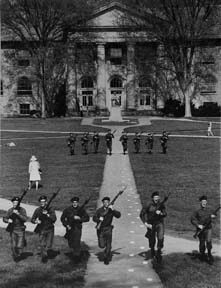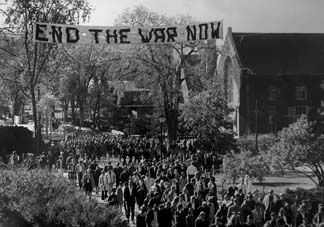'Teaching Vietnam: War and Culture' events roll out Nov. 10
By Franklin Crawford

Cornell University ROTC trainees charging across the Arts Quad with bayonets fixed, a safe-conduct pass for surrendering Viet Cong, Bobby Kennedy standing beside a rather bedraggled Big Red Bear. These images are just a random sampling from "Teaching Vietnam: War and Culture," a series of events and activities that includes a teacher's workshop, public talks, films and an exhibit that runs through the end of the month. Sponsored in part by the South Asia Outreach component of the Southeast Asia Program (SEAP), the events are aimed at understanding the war in Vietnam, a war that to this day remains clouded by disagreement, myth and misunderstanding.
The exhibit is on display at both the Tompkins County Public Library and the Echols Collection in the Kroch Library on campus. Images and other war-related materials were acquired through the Echols, the Kroch Library Division of Rare and Manuscript Collections, the county library and from Martin Loicano, a Cornell doctoral student in history.
"I find these items all over the place," said Loicano, who organized the exhibit with the help of SEAP's outreach office. "My interest in Vietnam is an outgrowth of my general interest in cultural and intellectual military history. I've been studying these subjects and the war since 1997."
Loicano, who speaks Vietnamese and Chinese, will join Fredrik Logevall, professor of history, and Keith Taylor, professor of Asian studies, in addressing various aspects of teaching Vietnam history and culture during a conference for middle and high school teachers Thursday, Nov. 10, at Cornell's George McT. Kahin Center for Advanced Research on Southeast Asia. The conference is held in conjunction with Tompkin-Seneca-Tioga BOCES. On Thursday night, Nov. 10, Logevall and Taylor will present a talk, "Why Does It Matter How We Remember the Vietnam War," at 7 p.m. in the Borg Warner Room of the public library in downtown Ithaca.

On Friday, Nov. 11 -- Veterans Day -- two films and a talk will be given, also at the public library: At 11 a.m., a screening of "Lament of a Warrior's Wife," followed by a discussion with Thuy Tranviet, a Cornell Vietnamese language teacher; at 1 p.m., the film "Regret to Inform," which will be followed by a discussion; and, at 3 p.m., Carl Steckler, a Cornell teaching support specialist in the physics department and a Vietnam veteran, will give a talk, "The Marines' Other War in Vietnam." Steckler's talk will offer a rare firsthand account of the Marines Combined Action Program in which platoons of Marines actually lived in South Vietnamese villages and provided protection, medical care and, at night, patrolled outside the village to search for the enemy. It is a model now in use in Iraq, Steckler said.
All Friday events also will be held in the library's Borg Warner room and are free and open to the public. For more information, visit http://www.einaudi.cornell.edu/southeastasia/calendar.
Logevall and Taylor co-teach a course, "The U.S.-Vietnam War," and each approaches the subject from a different point of view. However, both men agree that learning about the war is essential to understanding American history and that the war still exerts a powerful influence on foreign policy-making. But learning about America's involvement in Vietnam requires some serious effort as the story remains shrouded in politics and opinion.
"The way the war is remembered affects how we understand recent American history and how we think about ourselves as Americans today," said Taylor. "This country is politically polarized today because Americans have not made peace with how the war is remembered. … We stood in battle with Vietnamese, many of whom are today our fellow citizens, yet who are given no place in our discussions about a war that for them resulted in exile, a war that is still generally remembered in this country according to the wartime propaganda of the enemy."
North Vietnamese leaders, with backing from China, were successful to an extent in spreading the belief that the Vietnam War was unwinnable. Scholars and historians still debate whether that was true or if it was a matter of failed leadership on the part of the American government and military leaders.
Logevall said that remembering the war is relevant today because, "among other things, we can learn that citizens and voters need to be informed on the issues, and need to hold their elected representatives accountable.
"[President] Johnson and his advisers succeeded in heading off a full national debate on Vietnam in the critical months prior to the Americanization [of the war] in 1965, and they succeeded in good part because Congress and the people let them," Logevall said. "They were less than truthful about the situation on the ground in South Vietnam and their plans to address that situation, and got away with it in good part because of congressional timidity and [at that time] popular apathy."
Loicano said it is important to take a global view of the war -- the historical debate about the American war in Vietnam has "obscured the reality that the 25-year war between 1950 and 1975 was an international conflict superimposed on a Vietnamese civil war with a long history," first by the French and then by the U.S.
"Without international perspective centered on the Vietnamese, we have reduced our debate to questions on the morality of American involvement without recognizing that the U.S. is only one important component of the war," he said. "Chinese involvement was every bit as significant as American involvement, and we can only begin to understand the war by incorporating all of these participants and the vast knowledge each has collected about the war's origins, conduct and outcome."
SEAP is a U.S. Department of Education National Resource Center dedicated to furthering knowledge of the history, culture and societies of Southeast Asia for students, teachers, business, professionals and community members. The outreach program provides resources, classroom visits, cultural events and teacher training to K-12 schools in the Northeast. For more information about SEAP's outreach programs, visit http://www.einaudi.cornell.edu/southeastasia/outreach.
Media Contact
Get Cornell news delivered right to your inbox.
Subscribe